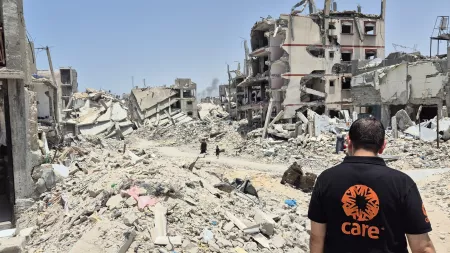In the past weeks, the Israeli military operation in the Gaza Strip has dramatically escalated, driving the enclave into even deeper levels of devastation. The targeting of a UN school used as a shelter in Nuseirat yesterday, as well as the massacres of Al Mawasi in the so-called "safe zone" and Al Shati in Gaza City on 13 July are the latest attacks against civilians amid an intensification of Israeli bombardments on heavily populated areas. The Israeli army issued new so-called “evacuation orders” against Khan Yunis and Gaza City, triggering additional mass forcible transfers and further squeezing Palestinians into smaller, overcrowded areas that lack the resources to support human life. As a result, the humanitarian catastrophe continues to deepen while obstacles for aid delivery remain dire.
These recent developments exacerbate the humanitarian catastrophe while aid organizations continue to face dire obstacles imposed by the continuation of Israeli military operations on the ground. In the Gaza Humanitarian Snapshot released on 15 July, 13 INGOs provide an accurate picture of the immense challenges that impede our humanitarian response in Gaza.
NGOs report that the entry of aid into Gaza has severely deteriorated since the Israeli major ground incursion into Rafah early May. The southern crossings are either fully closed or logistically unavailable due to the deterioration of security conditions. MSF, NRC, PUI, MdM, MC, SC, CARE, HI, and ActionAid report that tons of critically needed aid, intended to be delivered through the southern route, have been stuck for weeks, sometimes months. Aid delivery throughout the North remains limited: while channeling goods from Amman to North Gaza should not take more than 6 hours, it took Oxfam five weeks to enter 1,600 food parcels in North Gaza.
With alarming examples, we explain how our movement to reach those in need inside the Gaza strip is unsafe and restricted: military checks of humanitarian staff screened via cameras or drones at Israeli checkpoints, requirements to notify the Israeli authorities of their movements even within so-called “humanitarian zones”, or staff forced to use donkey carts due to the lack of fuel.
Our concerns for the lives of our staff continue to grow, as their security cannot even be guaranteed within our humanitarian premises. The recent killing of an HI staff and the obligation for MdM and MSF to leave health facilities due to Israeli attacks and so-called “evacuation orders” are recent examples of the absence of respect for parties to conflict’s responsibilities of ensuring the protection of humanitarians.
After 9 months of a destructive war, it is extremely urgent that Third States acknowledge their failure to abide by their obligations to ensure respect for IHL in Gaza, and consider exerting genuine pressure on parties to conflict to reach an immediate and lasting ceasefire, the only way to provide humanitarian assistance and protect and save lives in Gaza.
For media inquiries, please contact [email protected].
